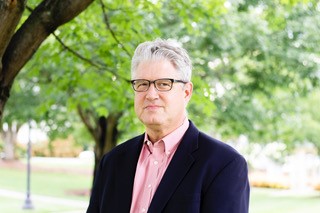By Allen Smart, Project Director for Rural Philanthropic Analysis at Campbell University and Founder, PhilanthropywoRx
TFN’s Intermountain West Funder Network is a regional network that seeks to inspire, strengthen and expand funding and philanthropic leadership in the Intermountain West that engages people in decisions that result in more environmentally sustainable, socially equitable, and economically prosperous regions and communities. For its tenth annual convening in Colorado Springs and nearby Manitou Springs, Col., IMWFN invited rural philanthropy expert Allen Smart as its closing keynote speaker. Allen also facilitated a conversation with IMWFN attendees. We asked him to share his insights and experience with the broader TFN audience.
Most of the participants in the Intermountain West Funder Network are inherently funders of rural work. Given the geography of the states represented by members, there isn’t a choice. A new generation of place-focused philanthropy, however, emphasizes how funders can partner with rural communities to work on the big long-term challenges as defined by the communities themselves. This key difference in approach — shifting from a responsive funder of rural projects to an intentional rural and small-town funder — has great potential to support the kind of community-sustained work that funders wish for but don’t often witness.
In April 2019, I facilitated a panel of Intermountain West funders committed to engaging with rural and small towns in ways that reflect many of the practices that I have collected over my 20-plus years leading and studying rural philanthropy around the country. David Leckey from the Orton Family Foundation, LaMonte Guillory with the LOR Foundation and Dr. Ned Calonge with The Colorado Trust all shared a similar perspective on finding the best ways to bring a big toolbox of foundation assets to their small and rural towns. While each foundation has distinct language and process, all the panelists stressed the need for:
- – On-the-ground, long-term relationship with their rural communities;
- – Flexibility in setting priorities, recognizing the best choices lie within those communities;
- – Engaging folks well beyond the sphere of non-profit and civic leaders.
These strategic choices all recognize the commonality of good rural philanthropic practice while creating space for work that is sustainable before, during and after grant funding.
Over the past two years, I have had the privilege of taking a look at rural philanthropy around the country and writing and presenting my observations to funders, rural advocates and the philanthropic and rural media. I have never been more optimistic about the work of rural-serving foundations. The leadership of funders in the rural space has never been more connected to community. On a cautionary note, however, I fear that the interest in rural issues by some larger funders — both public and private — may be similar to the flurries of activity we’ve seen in decades prior: temporary and plagued by a disconnect from community and lack of understanding of rural culture.
The theme of the Funders’ Network 2020 Annual Conference in San Diego is “Bridging the Divide.” This is a perfect platform for funders to intentionally learn with each other about the inherent connectivity between urban, suburban and rural communities in their service geographies. With few exceptions, all rural communities are connected to some place that they think of as the big town or the small city. A recent Washington Post story quoted a 2018 article in the Journal of Applied Economic Perspectives and Policy indicating that 60 percent of people who consider themselves rural actually live in a statistically defined urban area.] That’s many more people than the 60 million that we normally use as a base number to represent the rural population of the country. Once again, while funders may not consider themselves rural-serving, funders are touching the lives of many who consider themselves rural.
The opportunities for funders to develop their rural skills and interests are increasing at a rapid pace. In addition to TFN’s Intermountain West Funder Network, many national groups like the Neighborhood Funders Group and Grantmakers in Aging have specific rural initiatives to support their member’s interests. State grantmakers groups in states like Colorado, Minnesota and Texas are addressing rural issues. Check with your state and national affiliations for participation opportunities. Importantly, connect with the local or regional representatives for your local federal agencies like the USDA, Office of Rural Health Policy, Rural HUD and your regional EPA and Federal Reserve. All have new or enhanced rural platforms that provide partnership opportunities and learning for funders and your communities.
If you have been in the rural philanthropic space for years, we thank you! For those who are just starting, there are plenty of people who want to support you. Learn from those who have gone before.
About the Author

Allen Smart, Project Director for Rural Philanthropic Analysis, Campbell University
Allen is a national spokesperson and advocate for improving rural philanthropic practice under his group – PhilanthropywoRx. In addition, he recently completed a role as the Project Director for a national rural philanthropic project partially supported by the Robert Wood Johnson Foundation and based at Campbell University in Buies Creek, North Carolina. He regularly consults with regional and national foundations on rural and philanthropic strategy.
As part of his personal and professional interest in philanthropy, Allen regularly writes for sites such as The Daily Yonder, Inside Philanthropy, Grantcraft and Exponent Philanthropy, as well as presenting to national and regional organizations like Grantmakers in Health, Southeastern Council of Foundations, National Rural Assembly and the federal Office of Rural Health Policy. He is a member of the National Advisory Committee for the Rural Resource Hub at The University of North Dakota; the Culture of Health Prize Selection Committee for Robert Wood Johnson Foundation, Board of Directors for Healthy Communities by Design and the Board of the North Carolina Healthcare Association Foundation.
